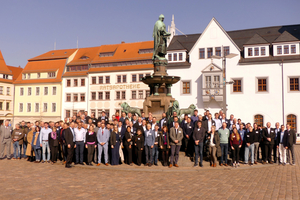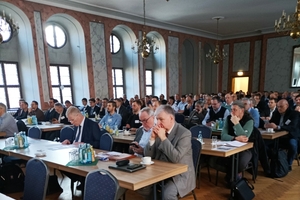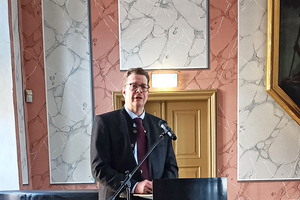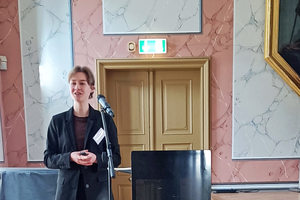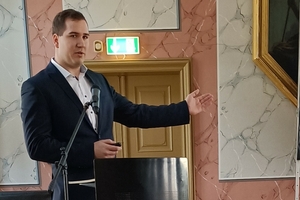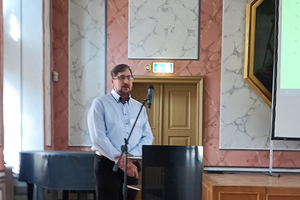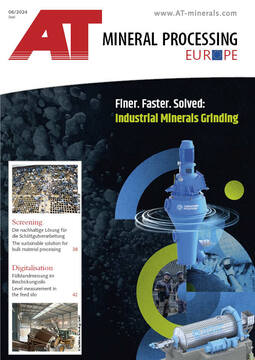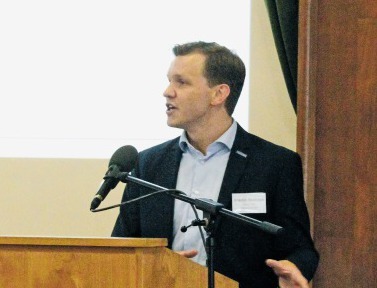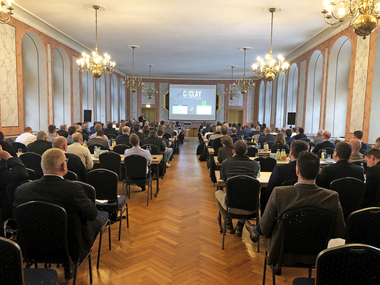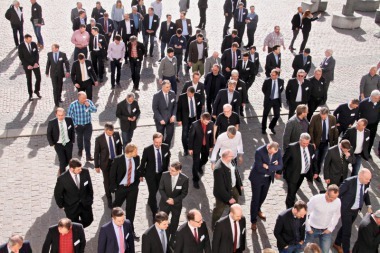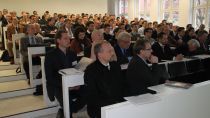Symposium for mineral processing technology in Freiberg/Saxony
Introductory lectures
In his welcoming speech, Florian Festge, Haver & Boecker OHG Oelde and Chairman of the Friends and Sponsors of the IART, named AI and engineering technology as the main topics of the symposium and explained the aims of the Friends’ Association, which include promoting R&D topics and developing teaching. In concrete terms, this means, for example, offering topics for student training, support with starting a career ororganizing excursions. Florian Festge was positive about the development of student numbers. The decline in first-year students has been halted. However, it is still important to make the mechanical engineering course in Freiberg even more attractive, which he called on everyone to help with.
In his welcoming speech, Prof. Lieberwirth explained the future significance of AI, which is already a key topic today – as here at the symposium - but also emphasized that “we will not allow ourselves to be bossed around by it. There are always people behind AI, it is ‘just’ mathematics, but there are huge amounts of numbers with stochastic models behind it. In this respect, AI will not replace people, rather people must stand behind it and contribute their knowledge.” Prof. Lieberwirth then introduced the IART, referred to the diploma course in mechanical engineering and particularly emphasized the possibility of cooperative studies – studying and working in a company at the same time. He concluded by presenting a number of projects, whereby the establishment of a green research center (Circ Econ-Center for green circular economy) together with the TU Dresden, the TU Chemnitz and the FHS Görlitz-Zittau is very promising.
Technical contributions
In thirteen specialist presentations, the latest research and operational results from the fields of AI for process monitoring, machines and systems as well as application examples of tried-and-tested treatment processes were presented, some of which are listed below.
Yassin Fela, FLSmidth Mining Technology GmbH Ennigerloh, dedicated his presentation “The gyratory crusher as a ‘smart sensor’ – process monitoring through anomaly detection” to the topic of increasing efficiency and reliability through advanced condition monitoring and digitalization of gyratory crushers in the mining industry. The resulting soft sensor forecasts can be used in a variety of ways. Analyzing the collected data with machine learning algorithms and combining AI with the specialist knowledge of OEM experts creates new opportunities for the mining industry. Thanks to AI and soft sensors, the machines equipped in this way have great potential for machine-to-machine communication, as they adapt independently to the material processing procedure.
A joint committee of authors from IART Freiberg and Köppern Entwicklungs-GmbH Hattingen presented in their paper – presented by Johannes Müller, IART – “AI for the cycle control of mineral processing plants” the objectives and influencing variables of such processing cycles using the example of the compacting-granulating process for the production of fertilizer granulates. In order to ensure a stable cycle, the individual process parameters must be optimally coordinated. In addition to the existing analysis methods, AI can be used to investigate the significance of individual parameters and thus represents an additional tool for investigating key process parameters.
In the contribution of another team of authors from RWTH Aachen University, Kleemann GmbH Göppingen, Point 8 GmbH Dortmund and the German Research Center for Artificial Intelligence GmbH Kaiserslautern (speaker Ms. Lieve Göbbels, RWTH Aachen University), the research project KIMBA (AI-based process control and automated quality management) was presented, which deals with the important topic of recycling construction and demolition waste into RC building materials through sensor-based inline monitoring of particle size distributions (KGVs). Initial results were presented in which the heterogeneous multi-layer RC material streams are measured using 3D laser triangulation measurement techniques and deep learning models are applied for particle segmentation and the prediction of KGVs.
Rupert Kirchner, CEMTEC Cement and Mining Technology GmbH Linz (AU), dealt with the “Use of AI methods for intelligent and autonomous grinding”. He presented an advanced approach based on reinforcementlearning to develop a flexible and adaptive control system for dry grinding circuits. After explaining the basics of this advanced and practical AI technology, he discussed its application in raw material preparation and showed that it enables the development and implementation of adaptive control systems that can make a significant contribution to the sustainable and efficient design of preparation processes.
The practical, process-oriented contributions also demonstrated the innovative spirit and wealth of ideas for the development and application of economical and equally ecological, sustainable processes for the production of high-quality processing products. For example, Dip.-Ing. Michael Bunzel, MUEG Mitteldeutsche Umwelt- und Entsorgung GmbH Großpösna, reported on the “Recycling of construction waste containing gypsum” based on almost 10 years of operation. The recycling of gypsum waste has become increasingly important since the decision to phase out coal and the resulting elimination of FGD gypsum. The recycling technology used at MUEG for gypsum plasterboard waste is characterized by a gentle shredding process that optimally guarantees the quality criteria of RC gypsum (monitored by a comprehensive quality management system) and thus the product status for this recycling material (see also AT Mineral Processing 01-02/2024 pp. 55-61).
New ideas in the field of mechanical and plant engineering for the extraction of recyclable materials from construction and demolition waste, which make up the largest proportion of waste by mass, are in demand and were also presented at this symposium. One example of this is the paper “Processing of secondary raw materials with integrated process water treatment using the example of recycling mixed construction waste” by Dipl.-Ing. Sebastian Kemper, WIMA Wilsdruffer Maschinen- und Anlagenbau GmbH Wilsdruff. By using hydro-density separation at water flow velocities of 300 – 700 m/s, it is possible to separate organic impurities in particular from the waste mixture and thus prepare the heavy fraction for further processing to produce RC construction materials. The process water required for this is circulated via an integrated water treatment system.
Smaller mobile plants that can not only be used flexibly but are also costsaving in terms of investment are often in demand, especially in the processing of construction waste or residual gravel. Gustav Beck, WIRTGEN DEUTSCHLAND Vertriebs- und Service GmbH Windhagen (“Mobile wet processing for natural and recycled aggregates with closed process water supply for the resource-saving production of standard-compliant concrete aggregates”) spoke about such a plant. He presented a realized project in which 150 000 t of a sand-gravel mixture 0/32 were removed during a construction project and then processed (wet screens, hydrocyclone, lamella clarification container; water treatment in a closed circuit). The aim was to obtain a washed gravel and sand grain with five fractions for concrete. The system is also used for washing grit grains (realized project in shell limestone). The high mobility and flexibility of the system was cited as a decisive advantage of the process development.
Without going into details, the following presentations on innovative technical developments should also be mentioned:
Wear measurements on shredding units (M. sc. Julius Ortmanns, Köppern Entwicklungs-GmbH Hattingen),
Modern solutions in screening technology – The new generation NIAGARA-T-Class (Klaus Fennenköfer, HAVER NIAGARA GmbH Münster),
Komarek – small compacting granulating machines for mineral materials (M.sc. Adrian Thamm, Köppern Aufbereitungstechnik GmbH Freiberg)
Summary
In his closing remarks, Prof. Lieberwirth emphasized the high number of participants and thanked the organizers for the event and the discipline of the speakers, as well as the adherence to the entire schedule. He invited interested parties to visit the IART after the lecture event.
The event was once again an eloquent example of the dovetailing of research and practice. The lecture program covered a wide range of processing technology, from the application of AI to screening and washing systems. Questions of economic efficiency, the recovery of recycling products and thus the conservation of resources through plant optimization are the order of the day and machine and plant engineering is facing up to these challenges. The first steps towards the application of AI in processing technology have already been taken and developments in this area will progress very quickly. AI will not replace humans, but rather support them – this was clearly demonstrated by the exciting presentations and discussions at the symposium.
The interesting and informative symposium came to an end with an evening event in a convivial atmosphere. The next symposium for processing technology is planned for March 6, 2025 in Freiberg.
Author:
Dr. Brigitte Hoffmann Consulting Kreislaufwirtschaft/Umweltschutz, Oberschöna/Germany

